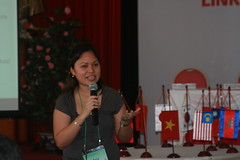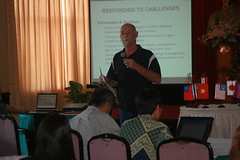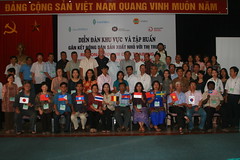Session 5 Presentation 1: Opportunites with the ASEAN Foundation
Session 5: Policy Framework and Opportunities to Make Markets Work for Small Farmers
ASEAN Foundation Opportunities
by Renelle Ivy Adan, Program Coordinator As a funding agency, the ASEAN Foundation can support human resource development projects (capacity development only, no infrastructure) such as those in the agricultural sector. Projects need to meet a set general criteria before they can be approved, such as that they have to be regional or sub-regional in nature (can not be country-based only, and are usually anywhere from 6 months to 3 years in duration. In terms of process, the foundation will request for 3-page concept paper to be submitted before a full proposal is developed. Because of the numerous back and forth between the foundation and the proponent, the project approval process can be quite lengthy (i.e. in the case of AsiaDHRRA with the LSFM project, the process took almost 6 months). All projects then needs to get the approval of the board of trustees, which is composed of the ambassadors of the member countries – a process that takes around two (2) weeks. Since 95% of the foundation’s funding comes from Japan, projects are also sent to them for final approval once approved by the board.
As a funding agency, the ASEAN Foundation can support human resource development projects (capacity development only, no infrastructure) such as those in the agricultural sector. Projects need to meet a set general criteria before they can be approved, such as that they have to be regional or sub-regional in nature (can not be country-based only, and are usually anywhere from 6 months to 3 years in duration. In terms of process, the foundation will request for 3-page concept paper to be submitted before a full proposal is developed. Because of the numerous back and forth between the foundation and the proponent, the project approval process can be quite lengthy (i.e. in the case of AsiaDHRRA with the LSFM project, the process took almost 6 months). All projects then needs to get the approval of the board of trustees, which is composed of the ambassadors of the member countries – a process that takes around two (2) weeks. Since 95% of the foundation’s funding comes from Japan, projects are also sent to them for final approval once approved by the board.
The ASEAN Foundation also provides scholarships on a per university basis. Through a partnership with Hewlett Packard, they have also been able to conduct IT trainings for farmers in Indonesia and will soon do the same for Cambodia and Laos. The foundation will be visiting each member country in the next four (4) months be discuss how organizations (private companies, NGOs, etc) can link up and avail of funding.
Proposals are accepted all year round. Requirements and details of project proposal submission shall be provided to all the participants.
Download Session 5 ASEAN Fdn Opportunities.ppt

